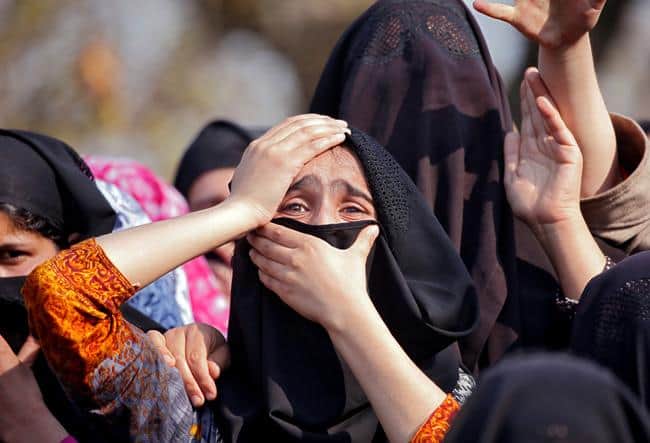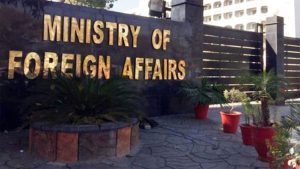Some moments last long by changing the course of history. In the recent history of Kashmir the people of the Occupied State witnessed such moments on October 26 and 27, 1947. In the wee hours of the morning on October 27 three hundred and thirty Indian army personnel of the First Sikh Battalion landed at the Srinagar airport statedly on the request of Maharaja Hari Singh, Ruler of the Jammu and Kashmir, made in his letter of October 26, 1947 to block the invasion of Kashmir by Pakistani tribesmen.
As a matter of fact, India had planned annexation of the State much earlier. On August 12, 1947 Maharaja Hari Singh had asked India and Pakistan to execute Standstill Agreement. Pakistan signed this agreement on August 14, 1947 but India did not because of her planning for annexation. For this purpose India made Hari Singh to sign this letter and Instrument of Accession on October 26, 1947. In ‘Danger in Kashmir’ (p.85), Prof. Josef Korbel wrote:-
“As a matter of record Gen. Sir Frank Messervey, who was the Commander in Chief of the Pakistan Army from August 15, 1947 to February 15, 1948 asserted that there was much evidence that accession had been deliberately planned for some weeks before the event.”
Pakistan strongly reacted to these Indian maneuvers and wanted to send troop to Kashmir but Field Marshal Auckenleck intervened and persuaded Mr. Jinnah, Governor General of Pakistan to discuss the issue with Lord Mountbatten, Governor General of India. According they met in Lahore on November 1, 1947. For resolving Kashmir issue, Pakistan’s Governor General proposed.
“1. To put an immediate stop to fighting, the two Governors-General should be authorized and vested with full powers by both Dominion Governments to issue a proclamation forthwith giving forty-eight hours’ notice to the two opposing forces to cease fire.”;
“2. Both the forces of Indian Dominion and the tribesmen to withdraw simultaneously and with the utmost expedition from Jammu and Kashmir State territory”;
“3. With the sanction of the two Dominion Governments, the two Governors-General to be given full powers to restore peace, undertake the administration of Jammu and Kashmir State, and arrange for a plebiscite without delay under their joint control and supervisions.”
India’s Governor-General gave counter proposal of “holding plebiscite under the United Nations auspices”.
In “Danger in Kashmir (p.89-90)’ the author wrote:-
“The tragedy, of course, is that no matter what conditions limited or seemed to limit Mountbatten’s ability to accept Jinnah’s proposals, had he been able to accept them there is much reason to believe that the fighting could have been stopped, the raiders withdrawn, and the plebiscite carried through quickly and without too many complications. Kashmir would have been spared months of further cruel fighting and years of partition, and, more important, the two Dominions could have smoothed out their present bitter estrangement, so dangerous to the peace of the world.”
On January 1, 1948 India brought Kashmir issue before the U.N. Security Council in order to get endorsement to the accession of Jammu and Kashmir to India and Pakistan declared as invader in Kashmir. The Security Council without accepting claim of India, passed its first important Resolution on April 21, 1948 which stated:-
“Being strongly of the opinion that the early restoration of peace and order in Jammu and Kashmir is essential and that India and Pakistan should do their utmost to bring about a cessation of all fighting.”
“Noting with satisfaction that both India and Pakistan desire that the question of the accession of Jammu and Kashmir to India or Pakistan should be decided through the democratic method of a free and impartial plebiscite.”
This was followed by a Resolution of the United Nations Commission for India and Pakistan dated August 13, 1948 which provided for prompt ceasefire and Truce Agreement. However, ceasefire was enforced with effect from January 1, 1949. By that time India had occupied larger part of the State and the remaining part by Pakistan.
Let me briefly discuss accession issue in its historical and legal perspective, assuming that Maharaja Hari Singh wrote letter to Mountbatten, Governor-General of India and executed Instrument of Accession in favour of India on October 26, 1947, as claimed by India. In 1819 Kashmir was occupied by Sikh Kingdom of Lahore. Raja Gulab Singh of Jammu, great grandfather of Maharaja Hari Singh, and his two brothers were holding high positions in the Sikh Kingdom. In 1846 after the death of Maharaja Ranjit Singh, Sikh forces were defeated by the British forces with the connivance of Raja Gulab Singh. Jammu and Kashmir was taken over by the British Government from Sikh Kingdom under the Treaty of Lahore dated March 9, 1846 and under the Treaty of Amritsar dated March 16, 1846 was transferred to (now) Maharaja Gulab Singh.
Thus Maharaja Hari Singh and his predecessor Dogra Rulers derived their power and authority to rule the State of Jammu and Kashmir under the Treaty of Amritsar, which itself was of dubious character. However, under Section 7(1)(b) of the Indian Independence Act, 1947 the Treaty of Amritsar and the rule of Maharaja Hari Singh ended with effect from August 15, 1947, Section 7(1)(b) reads;-
“….The suzerainty of His Majesty over the Indian States, lapses, and with it, all treaties and agreements in force on the date of the passing of this Act between His Majesty and the rulers of Indian States.”
(Note: Indian Independence Act was passed by the British Parliament in June, 1947 and became effective on August 15, 1947).
Consequently, with effect from August 15, 1947 Hari Singh ceased to be the ruler of the State of Jammu and Kashmir and had no power and authority to execute Instrument of Accession on October 26, 1947. All powers and authority to rule and govern the State had reverted to the people of the State of Jammu and Kashmir. Since the State was not part of British India, it became an independent State on August 15, 1947. In the White Paper (para 12) issued in 1964 by Jammu and Kashmir Plebiscite Front it was recorded:-
“The accession was thus effected by a lame duck ruler who had been deprived of capacity and the means to exercise his free will and volition and whose power to bind the State by any of his acts had vanished by reason of his authority and suzerainty over the Stat having been effectively repudiated:”
Thus October 26 and 27 of the year of 1947 became ominously important in the recent history of Kashmir. These two days ended century old tyranny and oppression of Dogra rule. Simultaneously brought in the State another kind of tyranny and oppression, now under the newly established democratic India. Since then democratic India denies to the people of Jammu and Kashmir State basic human rights and fundamental freedoms. Since then hundreds of thousands Muslims of Jammu and Kashmir have been killed and about the same number were forced to leave their homeland. Since then life, liberty, and dignity and property remain under constant threat. Past 28 years are witnessing more ruthless and oppressive rule by India.
The Report released by the UNHRC in June, 2018 is testimony to these facts:-
“Para 40: In 1990, India introduced the Armed Forces (Jammu and Kashmir) Special Powers Act (AFSPA) to manage the armed groups that had emerged by the end of the 1980s over objections to Indian control over Kashmir. A large number of Indian security forces were subsequently deployed in Kashmir with allegations of resulting serious human rights violations. Civil society and media often cite the figure of 500,000 to 700,000 troops which would make Kashmir one of the most militarized zones in the world. The allegations of human rights violations include torture and custodial deaths, rape, enforced disappearances and extrajudicial executions.”
In para 79 it is reported:-
“One of most dangerous weapons used against protesters during the unrest in 2016 was the pellet-firing shotgun, which is a 12-gauge pump-action shotgun that fires metal pellets.”
Since 1989 the Muslim women (young and old) in Kashmir are subjected to sexual violence by the army personnel and security forces as a weapon of war with impunity. In Para 126 the Report mentions: –
“In February 2018, the Support Group for Justice for Kunan Poshpora Survivors filed a petition before the State Human Rights Commission, urging the investigation into all cases of alleged sexual assault by security forces and non-State actors as well as reparations for survivors. The group provided the Commission with documentation in 143 cases of alleged sexual violence committed between1989 and 2017.”
In para 42 the Report states:
“Impunity for human rights violations and lack of access to justice are key human rights challenges in the state of Jammu and Kashmir.”
Since October 27, 1947 the Democratic India repeatedly made false promises, betrayed trust of and lied to the people of Jammu and Kashmir State and the international community. The first promise was made by the Governor-General of India in his letter dated October 27, 1947 to Hari Singh that, – “…the question of the State’s accession should be settled by a reference to the people”.
On November 1, 1947 the Governor-General of India suggested to the Governor-General of Pakistan to hold plebiscite under UN auspices. In the complaint dated January 1, 1948 to the Security Council against Pakistan, India reiterated the pledge:-
“…. Its people would be free to decide their future by the democratic method of a plebiscite or referendum…”
Again before the Security Council as recorded in its Resolution dated April 21, 1948 both India and Pakistan agreed that the question of the accession of Jammu and Kashmir…… should be decided through the democratic method of a free and impartial plebiscite.
On June 26, 1952 Indian Prime Minister, made the following statement in the Lok Sabha.
“And I say with all respect to our Constitution that it just does not matter what your Constitution says if the people of Kashmir do not want it, it will not go there.”
The Resolution of the United Nations Commission for India and Pakistan (UNCIP) dated August 13, 1948 recorded:-
“The Government of India and the Government of Pakistan reaffirm their wish that the future status of the State of Jammu and Kashmir shall be determined in accordance with the will of the people.”
On January 7, 1949 UNCIP in its Press Communique stated:-
“The Governments of India and Pakistan have informed the UNCIP that they have accepted the principles proposed by the Commission for holding of the plebiscite in the State of Jammu and Kashmir for the purpose of determining the States future status.”
In various subsequent Resolutions the Security Council upheld that only the people of the State of Jammu and Kashmir with their free will can determine political status of the State. The Security Council Resolution dated January 24, 1957 provides: –
“Reminding the Government and authorities concerned of the principle embodied in its resolutions of 21 April 1948 (S.726), 3 June 1948, 14 March 1950 (S.1669) and 30 March 1951 (S.2017/Rev.1), and the United Nations Commission for India and Pakistan resolutions of 13 August1948 (S.1100, para 75) and 5 January 1949 (S. 1196, Para 15), that the final disposition of the State of Jammu and Kashmir will be made in accordance with the will of the peoples expressed through the democratic method of a free and impartial plebiscite conducted under the auspices of the United Nations.”
“Re-affirms the affirmation in its resolution of30 March 1951 and declares that the convening of a Constituent Assembly as recommended by the General Council of the “All Jammu and Kashmir National Conference” and any action that Assembly may have taken or might attempt to take to determine the future shape and affiliation of the entire State or any part thereof, or action by the parties concerned in support of any such action by the Assembly, would not constitute a disposition of the State in accordance with the above principle.
History of the past 71 years has proved India wrong. She entered in Kashmir through fraud and force. Indian leadership thought that efflux of time, carrot and stick policy, farcical elections, direct rule from Delhi through Governors or indirect rule through proxy governments, military might and military operations, death and destruction, would resolve Kashmir dispute. But these policies failed. India failed to win the hearts of the people of Kashmir, not because of the instigation or support by Pakistan but because of the intransigence of Indian political leadership and military establishment and their conduct ever since India landed its forces in Kashmir in October, 1947.
International Law recognizes right of self-determination as a fundamental human right. The International Covenants on Human Rights declare:-
“All people have the right to self-determination. By virtue of that right they freely determine their political status and freely pursue their economic, social and cultural development.”
Thus the exercise of this right by the people of the erstwhile State of Jammu and Kashmir cannot be denied to them. They are entitled to decide their political future in a democratic manner freely adopting any option as envisaged in U.N. General Assembly Resolution No.2625/1970.
India and Pakistan have legal and moral obligation to provide to the people of Jammu and Kashmir proper opportunity to freely and fairly exercise the right of self-determination.
For the benefit of all concerned I reproduce some excerpts from the article ‘Indo-Pak Relations’ written by Lt. Gen. (Retd.) Naeem Khalid Lodhi of Pakistan Army (hoping his ex post facto permission) published in the daily “The News”, Lahore on June29, 2018:-
“Unfortunately both neighbours are afflicted with poverty, illiteracy, social and economic injustices and bad governance, to varying degrees. Social indicators are dismal and whatever resources have been developed, a major chunk of those are being wasted in continued useless confrontation.”
“So, can we try forgetting the bygones and start afresh, willingly accepting each other’s existence and importance, with an understanding that future rather than past should guide our relations?”
“Secondly both countries should talk about demilitrisation of the Kashmir Region. Simultaneously create easement of movement and interaction, enabling social and economic activities in the region. Encourage people to people contact thus creating the right environment to recognise Kashmiris as the legitimate third party and initiate debates in pursuit of final settlement of the issue.”
“I think it would amount to insulting our collective wisdom and foresight if we think we will never be able to correct our course. People, media, intellectuals, leaders, soldiers, traders, farmers, and every segment of civil society should get involved in carving out our new destiny and force the present tides of hate and bigotry to subside, replacing it with cooperation, understanding and love.”
Let Security Council discharge its obligations under Article 24 of the U.N. Charter and in terms of its Resolution on Kashmir dated 30 March, 1951,
“……it is the duty of the Security Council in carrying out its primary responsibility for the maintenance of international peace and security to aid the parties to reach an amicable solution of the Kashmir dispute and that a prompt settlement of this dispute is of vital importance to the maintenance of international peace and security.”














